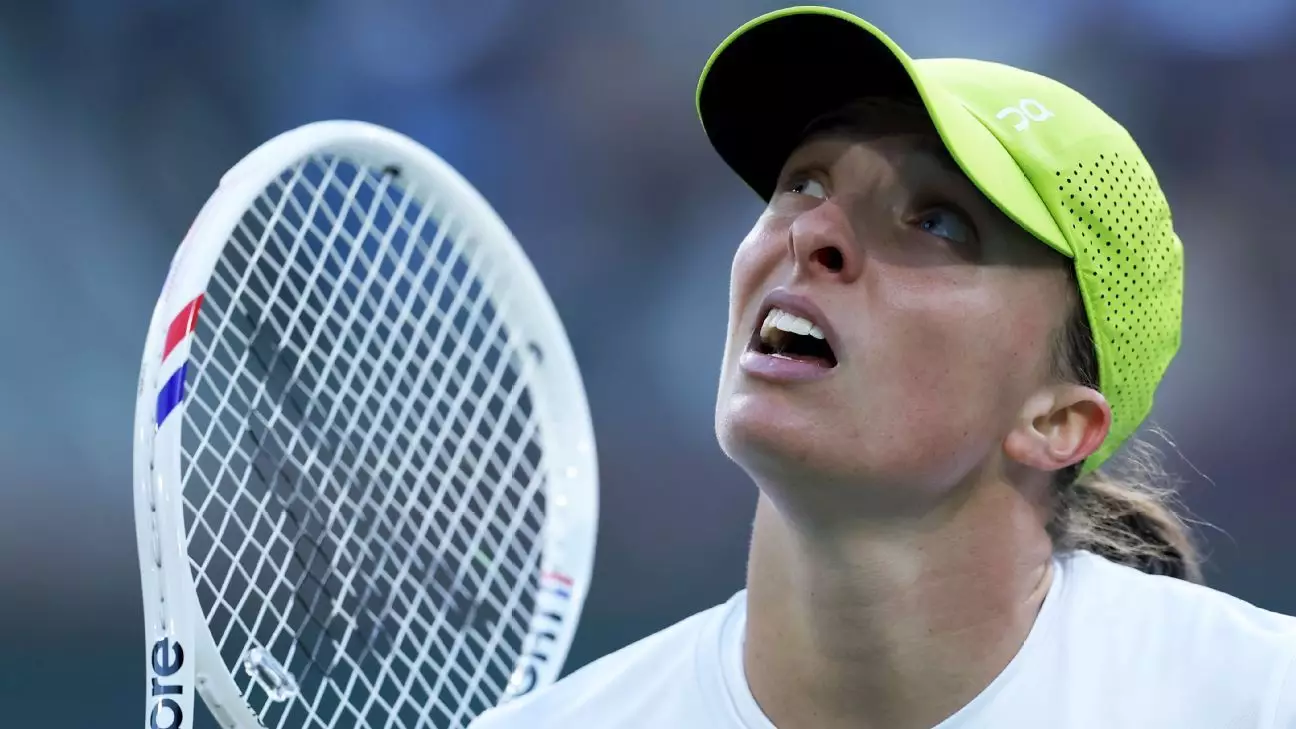Iga Swiatek’s journey in professional tennis goes beyond simple victories and titles; it’s a narrative rich with vulnerability, emotional challenges, and the weight of public scrutiny. Recently, the Polish tennis sensation took to social media to open up about her struggles over the past few months, shedding light on the pressures that athletes face beyond the court. This candid revelation came right before the Miami Open, where she is seeded second, emphasizing her readiness to confront the challenges surrounding her both on and off the field.
Swiatek candidly shared about enduring weeks of emotional torment, a stark contrast to the seemingly unshakeable demeanor she projects in professional settings. The acknowledgment of having spent “three weeks crying daily” reflects a seldom-discussed aspect of competitive sports: mental health. The convergence of high expectations, personal aspirations, and external judgments often creates an environment where athletes grapple with their emotional health, an experience that is not unique to Swiatek but one that deserves ample recognition and compassion.
Public Perception: The Harsh Spotlight of Judgment
In her post, Swiatek addressed recent backlash regarding an incident during a match where she nearly struck a ball boy in frustration. The online criticism she faced resonated with the complexities of being in the public eye. Players are frequently scrutinized for their actions, and Swiatek articulated her feelings about the „constant judgment“ that accompanies her profession. This leads to a wider discussion on how society often fails to consider the human element behind high-stakes performances. Rather than simply criticizing, there should be an understanding that athletes are entitled to frustrations, just like anyone else.
The dichotomy Swiatek describes—where she is labeled a “robot” for restraint and “hysterical” for emotional expression—underscores a troubling trend in sports culture. The rigid expectations placed on athletes can lead to isolation rather than camaraderie. In a world that often ignores emotional intrusions, Swiatek’s struggles reveal a profound truth: that vulnerability is not a weakness but a testament to resilience and humanity.
The Weight of Expectations: Balancing Fame and Performance
Swiatek’s reflection on her tumultuous year serves as a poignant reminder of the burdens athletes bear beneath their successes. Despite her impressive track record, including multiple Grand Slam titles—four of which she claimed at the French Open—she found herself embroiled in a scandal surrounding a doping case. Though she maintained her innocence, the incident cast a long shadow, creating uncertainty about her performance and mental state. The fallout from such events can be overwhelming, illustrating just how quickly the tide can turn in professional sports.
Interestingly, the doping allegation was not merely about compliance; it symbolized a larger struggle between her identity as an elite athlete and the unpredictability of external influences. Swiatek describes the second half of the previous year as “extremely challenging,” a period during which she felt her career could collapse. Such realities intensify the scrutiny she faces, and her choice to address these experiences openly is both brave and vital.
Toward a Healthier Discourse on Athlete Mental Health
Describing how her emotional displays have shifted public perception showcases a crucial need for dialogue regarding athlete mental health. Swiatek’s honesty sheds light on the importance of tolerance and understanding in sports. Just as her athletic skills demand constant refinement, so too do her emotional responses require acknowledgment as part of her holistic self. The emotional landscape of elite sports should not be just a background discussion; it deserves to be central.
By sharing her internal struggles, Swiatek contributes to a much-needed conversation about the complexities of mental health in sports—a topic that has historically been stigmatized. The dialogue she has initiated can foster a culture where athletes feel empowered to express their vulnerabilities while also reducing the societal pressure to maintain a façade of perfection.
Iga Swiatek’s openness regarding her emotional battles not only humanizes her as a competitor but serves as a powerful message for athletes and fans alike: it’s permissible to confront one’s challenges, and vulnerability should be embraced rather than shunned. In doing so, athletes can pave the way for a more nuanced understanding of what it means to be a professional competitor, leading to a healthier sporting environment overall.


Napsat komentář